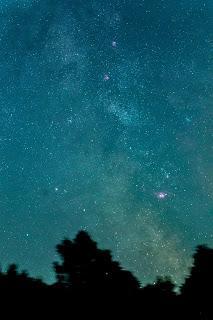
© Dan Oakley
Two RSPB reserves are the first in England to benefit from a special international award recognising the high quality of their starry night skies.On clear nights, visitors toRSPB reserves in West Sussex can enjoy the sparkling sights of distant stars and galaxies far beyond our planet, due to the darkness of their skies. RSPB Pulborough Brooks and Amberley Wildbrooks are within easy reach of millions of people in London and southeast England, and fall within the South Downs National Park (SDNP), which has recently been awarded the International Dark-sky Association International Dark Sky Reserve status following a successful bid. It is the second in England and only the 11th in the world to be awarded this status.Dan Oakley, South Downs National Park Senior Ranger, known as ‘Dark-skies’ Dan, and his group of dedicated volunteers spent three years mapping out the quality of night skies across the National Park. Skies over the Pulborough Brooks and Amberley Wildbrooks reserves have been measured and placed within bronze level status, meaning that on clear nights the Milky Way and Andromeda Galaxy can be seen with the naked eye.The special status will protect the new Dark Skies Reservefrom light pollution, meaning anyone from astronomers to amateur star gazers can enjoy far off stars and galaxies without the glow of street lights masking the view. It also offers people, plants and animals a break from an otherwise degraded nocturnal environment.J. Scott Feierabend, Executive Director of the IDA, said: “We are pleased to announce the designation of South Downs National Park as an IDA Dark Sky Reserve. It is remarkable that a true dark-sky experience remains within reach of nearly 17 million people in Greater London and southeast England, and a testament to the hard work of South Downs staff and area residents in keeping it that way.”Visitors to RSPB Pulborough Brooks can get closer to nocturnal nature thanks to a series of after dark events throughout June and July. Night time safaris offer the chance to see bats, owls, glow worms and the elusive nightjar, and the RSPB’s annual Big Wild Sleepout event, taking place 29th to 31st July, allows guests to book an overnight stay on the reserve.Anna Allum, Visitor Experience Manager at RSPB Pulborough Brooks said: “The night sky is one of the most beautiful of natural wonders and with Big Wild Sleepout just around the corner, this is the perfect opportunity for children, families and nature lovers to sleep out under the stars in their own gardens, nearby nature reserve or outdoor spaces. It’s the perfect time to practice your stargazing, explore the moon and discover nearby planets such as Jupiter, Mars and Venus.”To find out more about this year’s Big Wild Sleepout event and how to register, visit www.rspb.org.uk/sleepout
